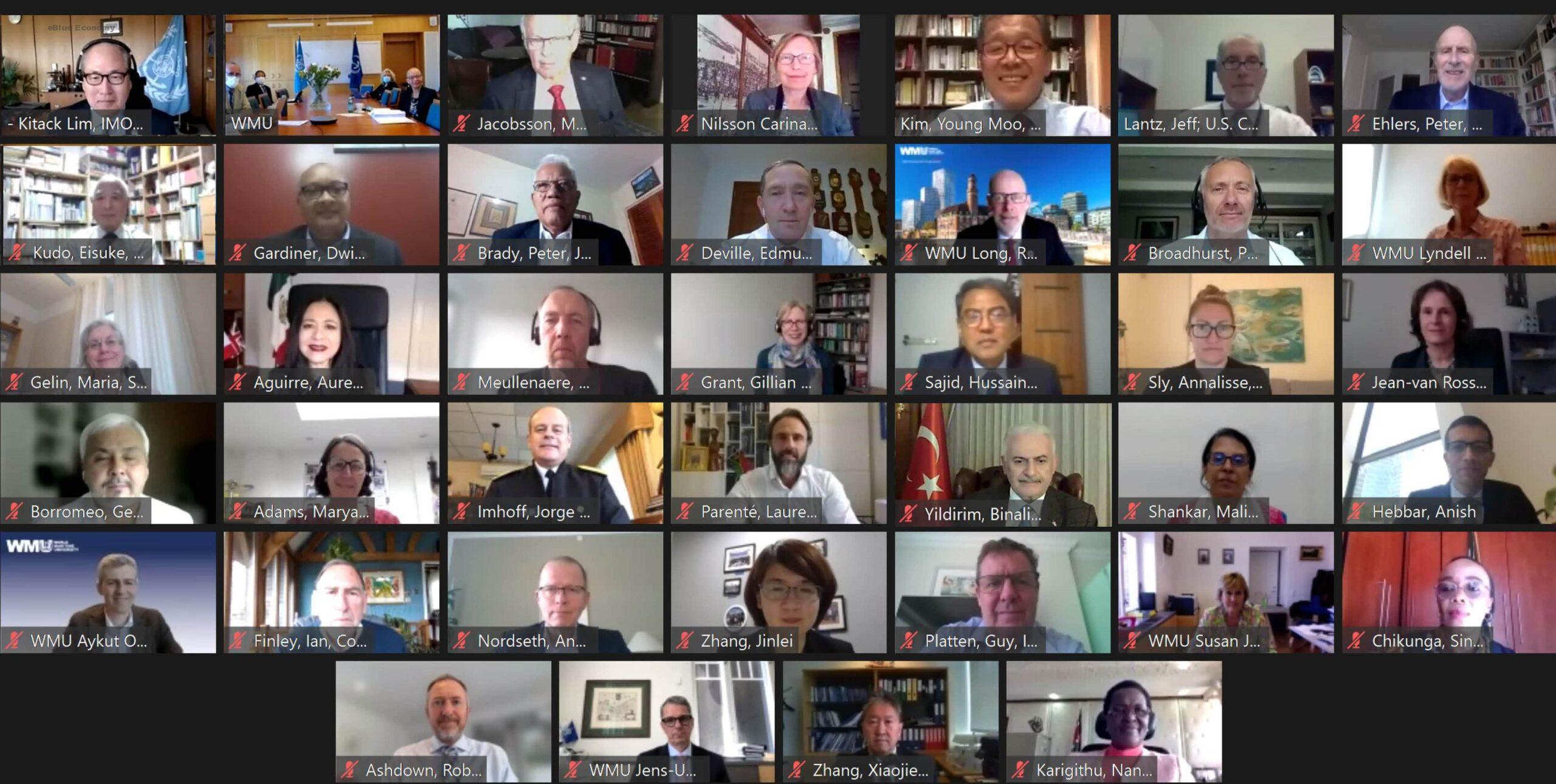The 39th session of the WMU Board of Governors took place on 17 May 2021. Due to the travel restrictions necessitated by the ongoing COVID-19 pandemic, the meeting was held by video conferencing.
The WMU Chancellor and Secretary-General of the International Maritime Organization (IMO), Mr. Kitack Lim, welcomed the Governors highlighting the appointment of new members that include: Ambassador Aureny Aguirre O. Sunza, Minister and Alternate Permanent Representative of Mexico to the IMO; Her Excellency Ambassador Geneviève Van Rossum, Permanent Representative of France to the IMO; Ms. Maryanne Adams, Deputy Commissioner, Maritime Affairs, Republic of the Marshall Islands; and Ms. Annalisse Sly, Alternate Permanent Representative of Australia to the IMO.

Mr. Lim expressed his appreciation to the Government of Sweden, the City of Malmö, and all donors for their continued and generous support to WMU. Addressing the Governors, he reflected on the founding and growth of the University saying, “WMU was created by and for the maritime community.
The idea was simple; how to effectively support the international exchange and transfer of knowledge. Every step of the way, from its humble beginnings, WMU was supported by a dedicated set of individuals, from WMU management and its governing boards to donors, staff, and even its students that would proudly promote WMU on their return to their countries.
The human element and confidence that each and every one of you is showing to WMU by actively participating in the University’s meetings keep the University alive, helping it set and achieve higher goals and become the center of excellence that it is today.” The Chancellor reiterated his wholehearted thanks to each Governor for their contribution and for continuing to believe in WMU and its mission.
The Governors considered and deliberated on six items with 14 documents on the agenda. Twenty-three substantive documents were considered via correspondence in advance of the meeting. Much attention was focused on the University’s education and research programs, budget, fees, WMU-IMO Cooperation, and the impact of the COVID-19 pandemic.
The Governors expressed their appreciation to the President and WMU Staff for keeping the University afloat amid the global health crisis, and to the IMO Technical Cooperation, and other Divisions, for their support of the University. The Governors also thanked the Executive Board for its work. Great attention was paid to the University’s ongoing and proactive response to the COVID‑19 pandemic and the steps taken to ensure the continued delivery of the programs while keeping Students and Staff safe.

Dr. Cleopatra Doumbia-Henry, President of WMU, conveyed that in light of the protective measures undertaken by the University, there have been no reported cases of infection of COVID-19 within the WMU MSc student community and that the University continues to provide face masks and hand sanitizer to Students and Staff.
It was noted that WMU’s work continues to be guided by the 2030 Agenda for Sustainable Development despite the negative impact of the COVID-19 pandemic. In 2020, the University continued to consolidate its donor and fellowship funding and to pursue continued institutional development. It was noted, with thanks, that with the continued support of Mr. Lim, WMU has further strengthened its relationship and cooperation with the IMO Secretariat and the University continues to implement academic projects on behalf of and for the IMO.
Sincere gratitude was expressed to WMU’s major donors that include Sweden, The Nippon Foundation of Japan, the Governments of Canada, China, and the Republic of Korea, and the International Transport Workers’ Federation (ITF). Appreciation for major fellowship donors was also expressed including The Sasakawa Peace Foundation/Nippon Foundation (30 – fellowships in 2020 -), the IMO Global Capacity Building Technical Cooperation Programme (10), Norway – NORAD (10), the Government of the Republic of Korea (6), the ITF Seafarers’ Trust (5), the Government of Germany (4), the TK Foundation (4), the Australia Maritime Safety Authority (3), the Orient’s Fond (3), the Government of the Netherlands (3), Stena Rederi AB (2), the International Chamber of Shipping (1), MPA Academy Singapore (1), the Norwegian Seafarers’ Union (1) and Gard AS (1).
President Doumbia-Henry thanked the Chancellor and Governors for their solid support and guidance throughout an exceptionally challenging year. She said, “The negative impact of COVID-19 will continue to require us to learn, adapt and look to innovative and smart ways of delivering on the mandate of WMU. As we mark more than 16 months after WHO declared COVID-19 a pandemic, there are certainly some takeaways.
It is clear that education cannot wait, and the journey to inspire leadership and innovation for a sustainable maritime and ocean future must be continued. WMU graduates are needed more than ever, innovating and contributing at different levels and in different sectors of the maritime and ocean industries to minimize the turbulence being experienced with global trade, the supply chain, and shipping in particular.”















